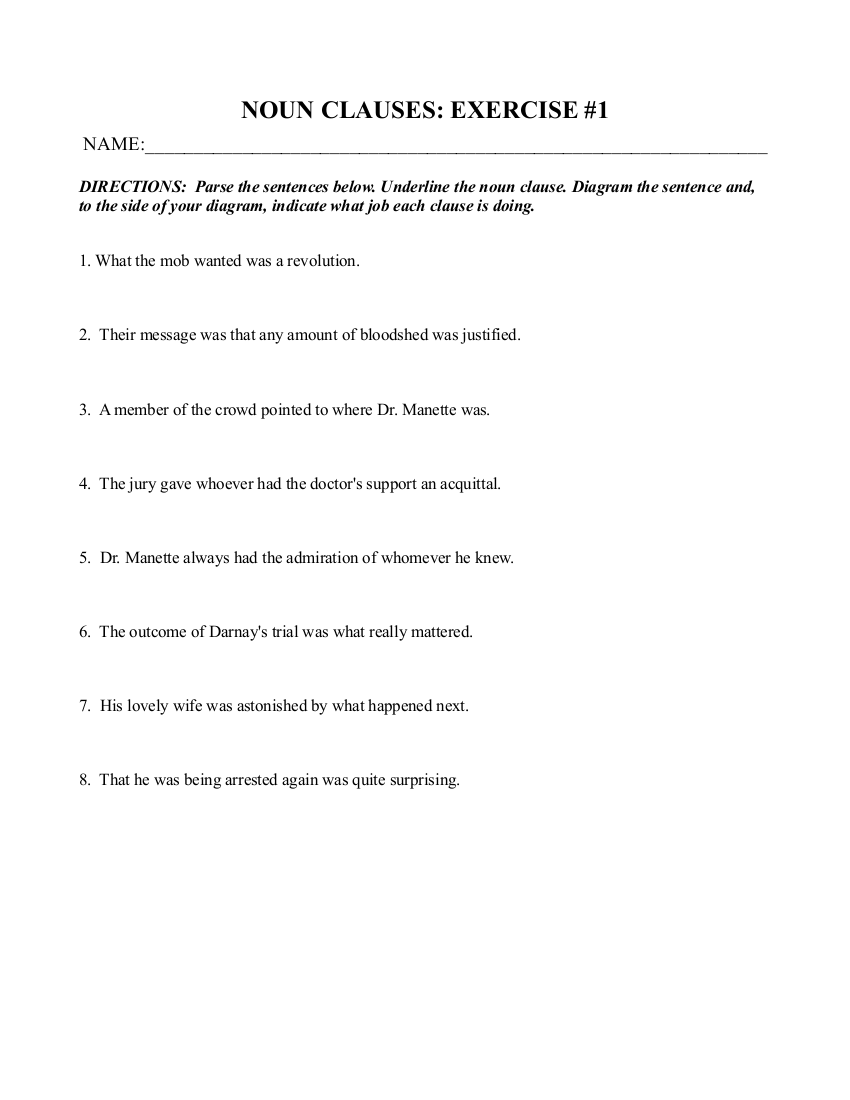Example Of Noun Clause | Need help understanding is a noun clause and what isn't? A noun clause starts with a conjunction like that, what, who, which, how, why, whom, whose, when, where, whether, whenever, wherever, whichever, if … example: In this posting i talk about how to form and correctly use noun clauses. A clause is a group of words containing a subject and a verb. For example (noun clauses shaded) here are some examples of noun clauses:
A noun clause is a dependent clause that contains a subject and a verb. What you have said makes her sad. When the noun clause is the object of the verb, it usually starts with the conjunction that, if, why, what or whether. Noun clauses will contain a subject and a verb, but they cannot stand alone in a sentence. In this lesson, we'll look at the dependent clause and its.
/Getty_noun_clause-102701000-57e47a443df78c690fb9ff86.jpg)
I saw how the accidenthappened. The download at the end will give you additional practice using noun clauses. For example, the following clauses are examples of noun clauses Just like nouns do, a noun clause names people for example, the village where i live is a good place for farming. Noun clause with if or whether. It is important to think about why she behaved like that. A noun clause is a dependent clause that acts as a noun. It answers the question what.) i don't believe in what i haven't experienced. Whether he's passed exam is still unknown. For example (noun clauses shaded) here are some examples of noun clauses: For example, a noun clause can be: It might be a noun clause. A noun clause is a clause that can take the place of a noun or a noun phrase in a sentence.
Noun clauses are defined as subordinate clauses formed by a subordinating conjunction followed by a clause. It might be a noun clause. They are noun clauses, adjective clauses, and adverbial clauses. Dependent clauses can function either as noun clauses, adjective clauses, or adverb clauses. There are a lot of ways that you can communicate and one of it is writing.

For example (noun clauses shaded) here are some examples of noun clauses: The two forms of noun clauses in the english language are finite noun clauses and nonfinite noun clauses. (here, the noun clause is working as the object of the verb know. It can be used as the subject, direct object, indirect object, object of a preposition noun clauses often begin with pronouns, subordinating conjunctions, or other words. A noun clause is that contains a finite verb and functioning like a noun within a sentences. Could you tell me whether she can help us. A noun clause with an implied that is a bit trickier, but you can do the same test. In this sentence, the clause where i live is an adjective clause and not a noun. Noun clauses will contain a subject and a verb, but they cannot stand alone in a sentence. It answers the question what.) i don't believe in what i haven't experienced. Buy gifts to whomever you want. I include many example sentences. Whether he's passed exam is still unknown.
The question is how to finish on time. 1.i like what i see. They are noun clauses, adjective clauses, and adverbial clauses. She believed that i was right. Noun clause with if or whether.

It is important to think about why she behaved like that. 2.4 noun clauses are also used with the empty subject 'it': It can be the subject of a sentence, an object, or a complement. What the boy told was true. A noun clause is a clause (containing a subject and a verb) that can replace a noun. A finite noun clause is a noun clause that contains a finite, or conjugated, verb phrase functioning as a predicate. We offer clauses definition, clauses meaning, and all types of clauses and some clauses examples with clauses exercises. A noun clause is a dependent clause that acts as a noun. 2.3 a noun clause is sometimes used as a subject: In this sentence, the clause where i live is an adjective clause and not a noun. (here, the noun clause is working as the object of the verb know. I didn't know that he was coming to the party. I include many example sentences.
Example Of Noun Clause: Whatever you are eating looks appealing.

No comments:
Post a Comment